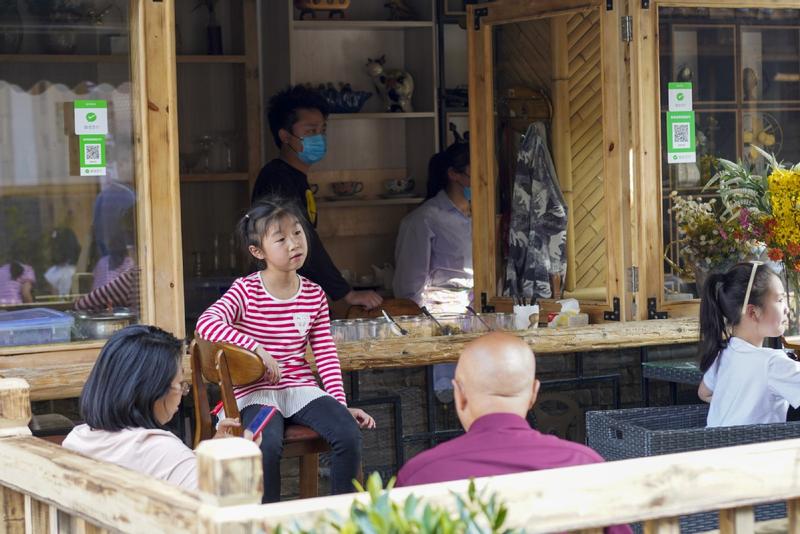 Tourists take a rest at a homestay inn in Lieshen village, Chongqing, on May 2. The local government is encouraging villagers to transform their houses into character-rich guest rooms for tourism development. (PHOTO / XINHUA)
Tourists take a rest at a homestay inn in Lieshen village, Chongqing, on May 2. The local government is encouraging villagers to transform their houses into character-rich guest rooms for tourism development. (PHOTO / XINHUA)
China's shared accommodation market has started recovering the ground lost due to the novel coronavirus epidemic, with transaction volumes firming up, a new report said.
According to the report, between March and May, transaction volumes in the shared accommodation sector rose by 78 percent, 199 percent and 35 percent on a monthly basis
The report, issued by the Sharing Economy Research Center under the State Information Center, showed that during the first five months of this year, transaction volumes in the country's shared accommodation market fell by 72.1 percent on a yearly basis.
Due to the epidemic, shared accommodation demand declined sharply in China with orders falling by 65 percent on a yearly basis during the first five months. The weak demand also triggered a significant drop in room prices, with average rates 16 percent lower than that of the same period last year.
Yu Fengxia, deputy director of the Sharing Economy Research Center, said:"The sector started to recover since March, with transaction volume, orders and accommodation numbers gradually picking up."
According to the report, between March and May, transaction volumes in the shared accommodation sector rose by 78 percent, 199 percent and 35 percent on a monthly basis, while order numbers grew by 141 percent, 152 percent and 50 percent on a monthly basis.
Data from Chinese vacation rental company Xiaozhu Inc showed that orders via online platforms like Alibaba's travel portal Feizhu were gradually picking up. Rural home stay orders on Feizhu rose by 600 percent on a quarterly basis during the second quarter of the year.
"Due to the epidemic, consumers are more keen to make countryside trips rather than city tours. They also prefer suburban tours to cross-provincial tours," said Wang Liantao, co-founder of Xiaozhu.
Business travel has also been gathering pace. According to Xiaozhu, business trip searches by consumers rose by 120 percent on a monthly basis in June, and the sector accounted for 36 percent of all travelers in the country, just behind vacation travelers.
"The epidemic has forced consumers to make changes in the way they travel and live. New accommodation forms such as camping tents and recreational vehicles are becoming popular, and consumers are paying more attention to user experiences and privacy. From April to June, tree house orders on Xiaozhu surged by nearly 40 percent, while camping tent orders grew by 60 percent," Wang said.
ALSO READ: Home-sharing inspires rural tourism
Yu said that with the epidemic control measures bearing fruit and the comprehensive macroeconomic recovery, public demand for high-quality life services, such as leisure and entertainment, will continue to grow. In the long run, the bullish outlook for the shared accommodation sector will remain unscathed, she said.
However, due to uncertainties in the global epidemic situation and the short-term effects of the economic uncertainties both at home and abroad, the tourism and accommodation sector will pose huge uncertainties for the shared accommodation industry, said Yu.
According to the report, the increasing uncertainties and the sluggish global recovery process will lead to an industry reshuffle, one that may see operators with weak risk mechanisms and poor service record exiting the market.
Industry experts aver that the sector badly needs firm policy support. On the one hand, existing policies should be better implemented; on the other, the government should offer more support to stimulate the market demand, diversifying tourism and accommodation services, innovating service forms, and enhancing cooperation between the government and enterprises, said the report.
READ MORE: Sharing economy shifts gears
Meanwhile, enterprises will also need to be more innovative to stay afloat. Xiaozhu utilized livestreaming, graphics and short videos for promotions and teamed up with lifestyle app Xiaohongshu so that users could directly place orders through the app.


